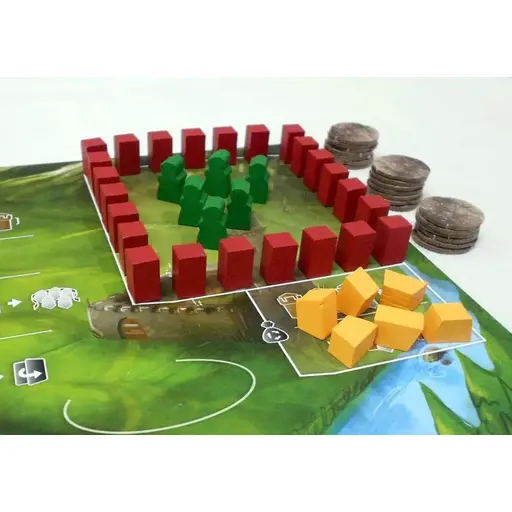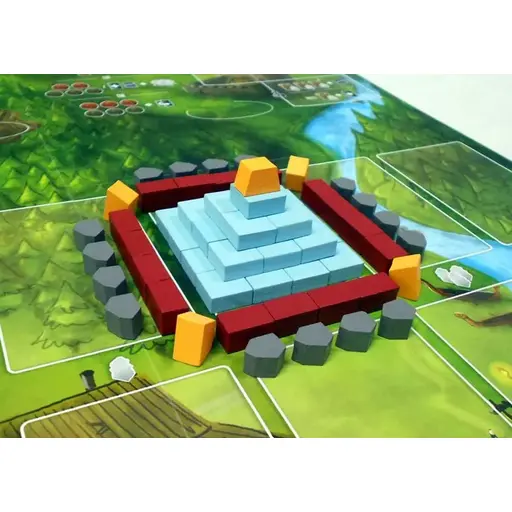Board Game Architects of the West Kingdom
A Great Construction for the Carolingians
Players are invited to become court architects of the Carolingian Empire of the mid-9th century. During the game, they will collect and exchange resources, trade on the black market, steal coins from the treasury, arrest workers, hire apprentices, work on blueprints, construct buildings, and jointly build a cathedral.
Before the game starts, players receive tablets, workers of their color, and starting coins (the first player gets 3 silver, and each subsequent player gets 1 more). They still need to draft building cards: participants receive four cards, choose one, pass the cards around, choose again, etc.
Gameplay
Participants take turns. The active player places a worker from the tablet in a selected location on the field. In locations with a large open circle, there can be any number of workers. On the black market - one at a time. In guilds, workers occupy free spaces from left to right and top to bottom.
Locations on the field:
- quarry / forest / mines / mint. By sending a worker there, the player receives as many units of a resource as his workers are present in the location.
- royal warehouse. By sending a worker there, the player can perform as many exchange processes as his workers are present in the location. Wood and stone are exchanged for marble here, and clay, wood and stone for virtue.
- workshop. You can get an assistant card for four coins. The more workers a player has in the workshop, the wider his choice (the fourth worker makes all assistant cards in a row available). Instead of hiring assistants, the player can get building cards - 1 card for the placed worker plus 1 card for each pair of his workers in the workshop.
- town square.By placing a worker here, you can pay silver and arrest a group of workers of the same color in a large unlocked location. The player can make as many arrests as he has workers in the square. You can arrest workers in the town square, even your own. Your own arrested workers are returned to the supply. Foreign workers are placed on the board.
- treasury(coins from red circles on the field fall into it). By placing a worker here, you can steal all coins from the state treasury, losing two virtues.
- black market. There are three places to place a worker. The available resources are determined by the current cards. You can also hire an assistant or get a building card. Black market cards are updated when three places in the market are occupied by workers or a worker is placed at the beginning of one of the lower guild rows. Workers from the black market are sent directly to the dungeon. Players with three or more workers in the dungeon lose one virtue. And the one with the most workers in the dungeon gets 1 debt.
- guard post. After placing a worker, the player performs any of the following actions (as many times as there are workers on the post):
- sends all arrested workers from the tablet to the dungeon, receiving 1 silver for each;
- frees all his workers from the dungeon;
- pays 5 silver coins OR takes on a debt and spends integrity to return his arrested workers from someone else`s tablet;
- pays 6 silver coins to pay off 1 debt.
- guild.The player places his worker in the next free cell and builds a structure or erects a cathedral. Structure cards are laid out from his hand in front of the player. The cards indicate the cost (resources), requirements (the presence of certain assistants), reward (integrity), and effect. If a player wishes to contribute to the construction of the cathedral, they spend resources and discard a building card from their hand to advance one level and receive an instant reward.
End of the game
The game ends when someone`s worker occupies the last free space in the guild. All participants take one more turn. Then they start counting points.
They receive victory points:
- indicated on the buildings they have built;
- according to the level they have in the cathedral;
- 1 point for each gold;
- 1 point for each marble;
- 1 point for each 10 coins.
Depending on the current position on the integrity track, you can either gain or lose points.
Players must also lose:
- 2 points for each unpaid debt;
- 1 point for each pair of their workers in the dungeon.
The player with the most points wins.
Publisher: Lord of Boards
Language: Ukrainian
Players: 1-5
Play time: 60-80 m
Age: 12+
- Playing board
- 35 clay
- 40 wood
- 40 stone
- 25 gold
- 30 marble
- 50 coin tokens
- 10 player tokens (5 colors)
- 100 workers (5 colors)
- 10 black market cards
- 22 debt cards
- 11 reward cards
- 6 multiplier cards
- 5 double-sided player boards
- 40 helper cards
- 40 building cards For solo play
- 1 double-sided player board
- 2 landmark cards
- 30 circuit cards





